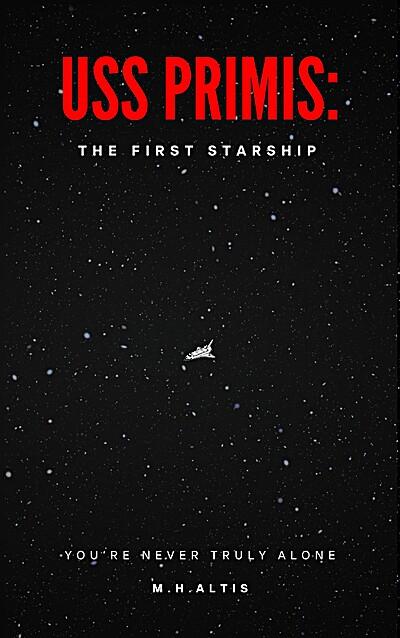Book Review: USS Primis -- The First Starship
USS Primis -- The First Starship by M. H. Altis
 "Two poorly assembled jigsaw puzzles."
"Two poorly assembled jigsaw puzzles."
Summary: Two half-books come together and attempt to tell a meaningful story that ultimately leaves you wanting a twist that never comes.
Synopsis: The captian of Earth's first extrasolar colonization and terraforming mission asseses his fellow crewmembers and their chances of successfully completeting their mission to save humanity from complete destruction. Unsurprisingly, things go badly, aboard the USS Primis and, with the mission in danger of utter failure, Captain Davis must decide what sort of victory he is going to claim.
Review: No matter how you approach this book, half of it feels irrelevant. In the first nine chapters, Captain Davis breezily evaluates each of his eleven crew members, detailing their personalities and abilities in his personal log, which we somehow have access to. But this lengthy assessment feels pointless because, in the end, only two of the twelve characters have any bearing on the second half of the book. Alternatively, the second half could be seen as the wasted portion, where most of the characters are permanently sidelined, leaving just two to fight for survival and decide how to complete what little remains of the original mission. The second half hinges entirely on the inevitability laid out by the Captain in the first.
This reads like two novellas awkwardly mashed together in an effort to create a single novel. It's as if two different jigsaw puzzles were cut from the same mold — the pieces technically fit, but the final picture is disjointed and unsatisfying.
On one hand, we get an intriguing look at the crew — their motivations, skills, and specialties. They've been chosen to colonize a distant extrasolar planet in a last-ditch effort to save humanity from an Earth that’s on the brink of destruction. Apparently, we sealed our fate by intentionally launching nukes into the sun. Why? It’s unclear and, in the end, irrelevant. The real focus of chapters one through nine isn’t the reason everyone’s desperate to escape Earth but rather the captain's personal take on his crew. It’s key to remember that these aren’t full profiles — just the captain's impressions. So, what we’re really exploring here is the captain’s psychology, not the crew’s.
The disconnect between the two halves of the book becomes obvious in the second half. After hypersleep, one of the crew members (no spoilers, but again, it doesn’t really matter) wakes up too early because their sleep pod malfunctions—thanks to their own mistake. With centuries of travel still ahead and the realization that they'll be alone in space for the rest of their life, they begin to unravel. Their solution? Wake up another crew member. Instead of owning up to their error, they try to convince the newly awakened Captain that everything is fine, and they’re still on course. Naturally, this fails spectacularly. Once the Captain catches on, a tense game of cat and mouse ensues, with the Captain trying to stop the rogue crew member from sabotaging the entire mission.
Given that part of the game is eliminating the rest of the crew while they’re still in hypersleep, it’s puzzling why so much of the first half was spent introducing them. We have no real investment in their fates, except for one, because we’ve only seen them through the captain’s eyes. All we have to go on are his impressions and feelings. Since he’s already told us what he thinks of them, we adopt his perspective by default. As a result, we can't care about the crew any more than Captain Davis does. And Captain Davis definitely does not like all of them.
This leads to another issue: the second half is told from the wrong perspective, at least initially. After hypersleep, we’re dropped into the offending crew member’s point of view, even though we spent the entire first half in Captain Davis’. Then, once the Captain wakes up, we switch back to his POV, but from there the narrative flips between the two. The problem is that the second half is trying hard to be suspenseful and tense — it wants to be a thriller. But because the POV shifts freely, we always know what’s happening and what both characters are thinking. If we had stayed in the Captain’s perspective, unaware that the other crew member woke up early and was attempting a ruse, real tension could have developed as the Captain slowly pieces together what’s off. Keeping the reader in the dark would have made the earlier psychological focus more relevant, while heightening the suspense as the inevitable conclusion of USS Primis unfolds.
Ultimately, the conclusion of Primis is disappointing, especially for those familiar with The Twilight Zone TV series. The writing led me to anticipate a big reveal at the end — perhaps the crew was all in a simulation, being evaluated for their roles on an upcoming mission. This could have served as a psychological dry run to identify who would succeed and who should be overlooked due to underlying, undetected issues. It needed a big twist at the end to make reading it worthwhile.
Overall, while M. H. Altis' USS Primis -- The First Starship includes a few intriguing elements, its two stages feel mismatched, and it ultimately fails to launch.